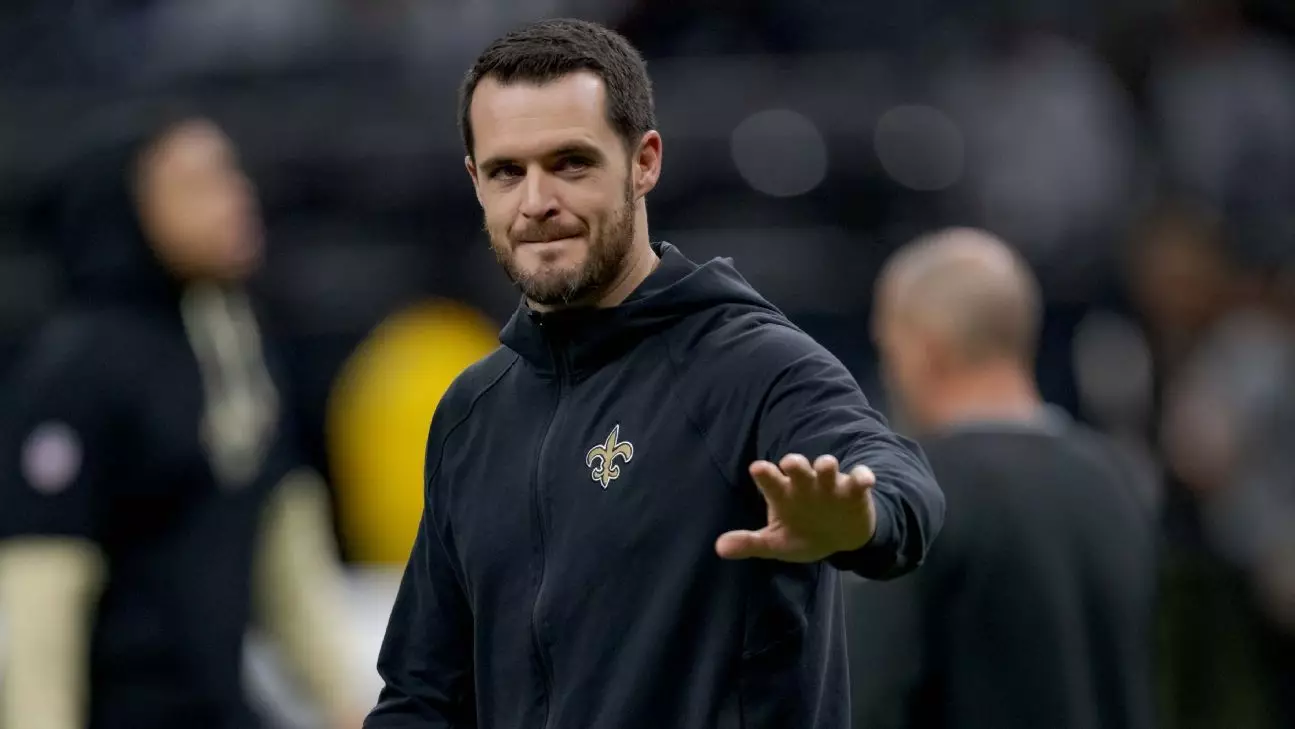Injury Faith and Competition A Look into Derek Carr’s Offseason Decisions
Sometimes, life throws curveballs that test not just our physical limits but also our emotional and spiritual resilience. For Derek Carr, the quarterback of the New Orleans Saints, this offseason has been precisely one of those times. As someone who loves football and everything it stands for, I can imagine how challenging it must be for Carr to navigate through the stormy waters of a shoulder injury while maintaining his role as a team leader. His story is not just about sports; it’s a testament to how we can all find strength in adversity.
I remember watching Carr play and being amazed by his dedication and skill on the field. Seeing him now, caught in a whirlwind of media speculation due to his injury, is a stark reminder of the pressures athletes face. These aren’t just players; they are individuals with lives outside of the stadium. Derek’s candidness during a recent sermon at Church LV in Las Vegas touched me deeply. It was a moment where he laid bare his struggles, reminding us all that even sports icons have personal battles to fight.
Key Takeaways
- Derek Carr’s shoulder injury has sparked significant media attention.
- His personal life, including family struggles, complicates his professional responsibilities.
- The competition from rookie Tyler Shough adds pressure to Carr’s leadership role.
Facing Media Speculation
The world of sports thrives on narratives, and Derek Carr finds himself at the center of one that’s both challenging and deeply personal. With his shoulder injury becoming public knowledge just before voluntary offseason workouts, fans and analysts have been buzzing. The uncertainty surrounding his condition has only intensified with outlets like ESPN adding fuel to the fire. For Carr, this situation is not just about physical recovery but also managing public perception—a task that can be as daunting as any opponent on the field.
What’s particularly striking is Carr’s need to publicly defend his health status. He expressed frustration over the speculation and even mentioned having MRI reports to back up his claims. This defensive posture reveals the intense scrutiny athletes face when their health becomes a topic of conversation. It raises questions about privacy versus transparency, especially when such issues impact not only professional standings but also personal well-being.
Personal Struggles Amidst Professional Obligations
Athletes often seem invincible when they’re at the top of their game, but Derek Carr’s story reminds us that they are human too. While dealing with his own health issues, Carr’s wife Heather faced significant challenges, including a miscarriage. This deeply personal experience impacted his ability to be present at the Saints’ facilities, underscoring how life can sometimes intrude on professional commitments. Through this ordeal, Carr calls for empathy from fans and media, urging them not to judge without understanding the full picture.
Carr’s mantra of “faith, family, and football” speaks volumes about his priorities during such trying times. It’s an ethos that resonates beyond sports, serving as a poignant reminder that success isn’t solely measured by career achievements. In a world where athletes are often seen as mere performers, Carr’s focus on family during turbulent times highlights the importance of mental and emotional health alongside physical prowess.

The Path Forward Competition and Leadership
As if managing a personal crisis weren’t enough, Derek Carr must also contend with new challenges on the field. The introduction of rookie quarterback Tyler Shough adds an extra layer of complexity to his role within the team. While Saints General Manager Mickey Loomis assures that “Derek’s the starter,” this doesn’t eliminate the underlying tension brought about by competition. Balancing recovery from injury with maintaining leadership isn’t easy, especially when one’s future with the team feels uncertain.
This scenario could be seen as either a threat or motivation for Carr. The presence of Shough might push him to reaffirm his position as a leader and demonstrate resilience amid adversity. Yet again, sports serve as a mirror reflecting broader life challenges—how does one manage personal setbacks while fulfilling professional duties? For Carr, finding this balance will not only define his journey but also influence how effectively he leads the Saints into their next season.

Final Thoughts
Derek Carr’s offseason journey offers more than just insights into an athlete’s life; it’s a narrative filled with lessons applicable to us all. His navigation through injury, faith-inspired resilience, and competitive pressures underscores universal themes relevant beyond sports arenas. It’s about finding strength amidst vulnerability and learning how intertwined our personal lives are with our professional roles. As you reflect on Carr’s experiences, consider how you might apply these lessons in your own life—embracing challenges while keeping sight of what truly matters.
Derek Carr
New Orleans Saints
shoulder injury
athlete challenges
sports leadership


Leave a Reply